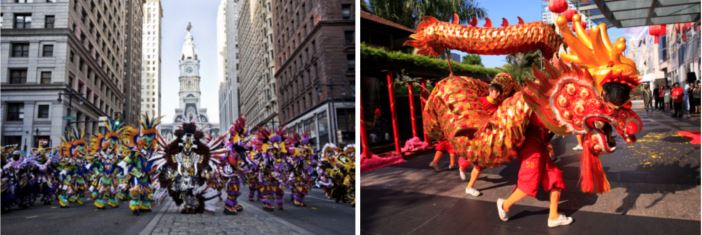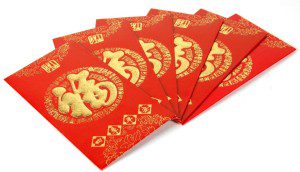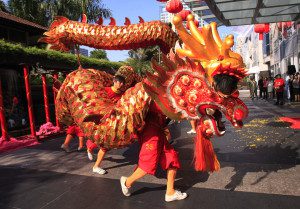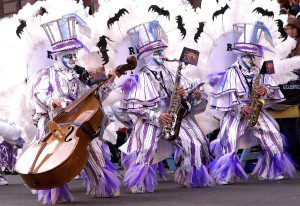Happy New Year…again! Yesterday marked the start of the year of the monkey, the ninth animal in the 12-year cycle of Chinese astrology. With celebrations happening across the world, I decided it would be a good time to put together a list of comparisons showing that we aren’t all that different when ringing in the New Year. In fact, we’re all a little weird when it comes to our traditions.
When is it?
The Chinese New Year takes place around late January – early February. Philadelphians, along with the rest of Western culture, celebrate New Year’s Day on January 1st.
How long is it celebrated for?
The Chinese keep the celebrations going for 2-3 weeks, while Philadelphians observe the holiday for 2…maybe 3 days (if it’s a weekend).
How is it celebrated?
We both have parades, festivals, and fireworks. The Chinese dress up as dragons symbolizing great power, dignity, fertility, and wisdom. The Dragon Dance, a form of traditional dance, is performed on this day. In Chinese culture, dragons are believed to bring good luck. Dumplings, which are shaped like ingot (元宝 – the currency used in old times) are often eaten on this day along with noodles. Because noodles are long, they represent prosperity. The Chinese also give money to children and seniors that are exchanged in red envelopes – red signifying good fortune. There’s now a phone app for sending cyber envelopes of cash.
Philadelphia, on the other hand, hosts the Mummers Day Parade, one of the oldest folk festivals in America. Men (and now women) dress in drag, paint their faces, and dance with umbrellas. Local clubs compete in one of four categories: comics, fancies, string bands, or fancy brigades. As a way of showing their gratitude, Philadelphians give shots of liquor which could technically be exchanged in a red glass with no significance necessarily attached to its color. We also tend to eat anything in sight.
Why is it celebrated?
The Chinese New Year marks the first day on the Chinese calendar. It’s a time for families to be together. The New Year’s Eve dinner is called Reunion Dinner, the most important meal of the year. New Year’s Day in Western culture marks the first day on the Gregorian as well as the Julian calendar. Celebrated with friends and family, it is a time for fresh starts, new commitments, and another excuse to party.
(AP Photo/Sakchai Lalit)
Origin of the festivals?
The Chinese tale is as follows: The Jade Emperor summoned all the animals of the universe for either a race, banquet, or meeting. Depends on who’s telling the story. This is one of those whisper down the lane scenarios where details become lost in translation. These 12 animals (Rat, Ox, Tiger, Rabbit, Dragon, Snake, Horse, Ram, Monkey, Chicken, Dog, Pig) began their trek to the meeting place. The rat ends up winning the race through scheming and other sorts of trickery. The years thus granted to them in the order they had arrived at the meeting place.
While we don’t assign animals to each year, the Mummers Day Parade has a history of its own. Tracing back to mid-17th-century roots, a Mummers Play (traditionally rooted in the United Kingdom) performed in Philadelphia. Over time, it evolved into a New Year’s Day parade. While it was initially made up Italian and Irish immigrant groups, Asian, Hispanic, and LGBT brigades have joined the parade festivities in recent years.
Other nicknames?
Chinese New Year is also known as the Spring Festival or Lunar New Year. Welp, we just call it New Year’s Day.
Whether you celebrate both or just one, today is a good day for a fresh start on those New Year’s resolutions you may have already forgotten about.




